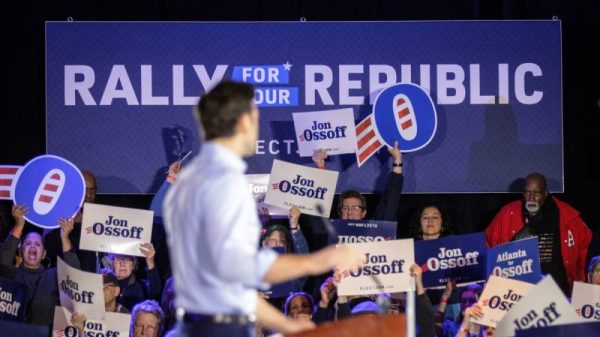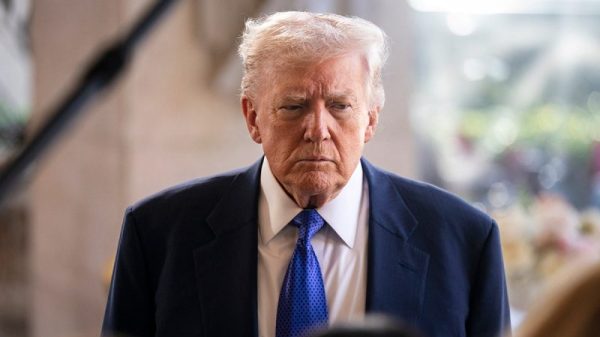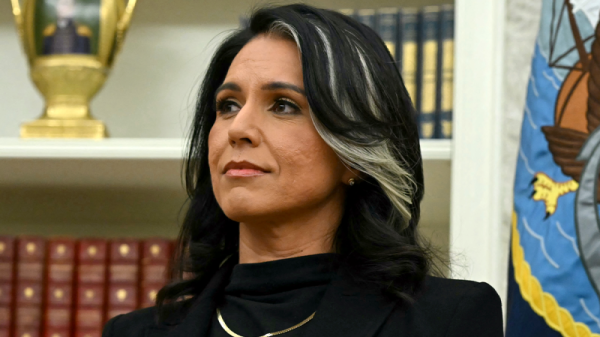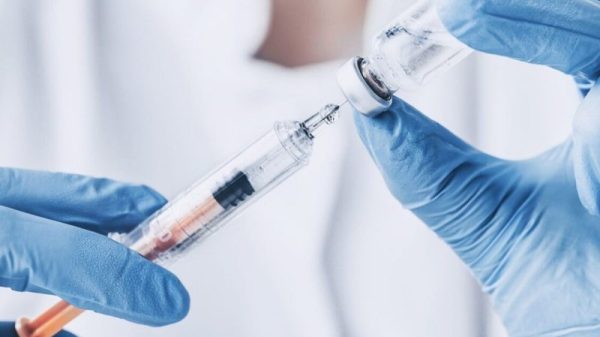DES MOINES — The narrative that has enveloped the presidential campaign of Florida Gov. Ron DeSantis is now almost uniformly negative: He’s described as a candidate who lacks people skills. His campaign operation has been messy. He’s fallen from the heights at which he began the year.
All of that is accurate but doesn’t fully describe the balance sheet of candidate DeSantis. On a weekend when the political world was focused on Iowa, on a day when DeSantis competed for attention with former president Donald Trump at the Iowa State Fair, there were reminders of why the Florida governor, though distinctly trailing, remains Trump’s principal rival for the nomination.
Iowa state Rep. Tom Moore was waiting for DeSantis to arrive on Friday morning in the small town of Atlantic an hour or so west of Des Moines. He was a Trump voter but thinks the former president has too much baggage to win in 2024. Now a DeSantis supporter, he offered a positive, though measured, assessment of the state of the governor’s campaign.
Moore acknowledged that things were “rough” at the beginning. “I think that’s changed,” he said. “From what I’ve seen from the DeSantis from when he started the campaign to now, I see him evolving into a much more — I don’t know, I want to say, a cleaner candidate. He doesn’t have the gaffes on stage and that type of thing. I just think he’s really matured as a candidate.”
The liability side of the DeSantis balance sheet is still significant. The past week, he replaced his campaign manager Generra Peck, installed James Uthmeier, his gubernatorial chief of staff, in her place, and brought in David Polyansky, a seasoned Republican strategist with deep experience in Iowa, as deputy campaign manager. Polyansky had been working with Never Back Down, the super PAC backing DeSantis.
The staff shake-up continued a weeks-long reset — and weeks of bad press — for an operation that was spending money at a prodigious clip and that had been forced to lay off a third of its seemingly bloated staff. Because campaigns reflect the candidate, DeSantis, who repeatedly claims to be an effective manager and someone who could get on top of big problems as president, the fallout rightly landed on his shoulders.
All the while, DeSantis has trailed far behind Trump in the polls, both here in Iowa and nationally, in some cases losing ground during a summer in which other GOP rivals are eager to emerge as the main alternative to the former president.
The staff changes added to commentary that DeSantis is continuing to decline as a threat to Trump and that his problems could provide openings for other candidates — South Carolina Sen. Tim Scott, entrepreneur Vivek Ramaswamy, former South Carolina governor and U.N. ambassador Nikki Haley, former vice president Mike Pence, former New Jersey governor Chris Christie, former Arkansas governor Asa Hutchison — to rise at his expense.
Here in Iowa, some of the governor’s supporters looked at the staff shake-up through a different prism, arguing that personnel problems are generally lost on voters. “There are plenty of campaigns that go through those sorts of growing pains and things of that kind,” said state Rep. Steven Holt, who introduced the governor at an American Legion post in Harlan. “I’m confident Governor DeSantis can put the team together.”
Amid the negative coverage, DeSantis ended the week with some positive news. His super PAC, which is running the campaign’s ground operation, that of identifying and turning out voters, announced that they now have county coordinators in all 99 counties. That’s an essential benchmark in the time-consuming process of building the kind of organization that can deliver voters on caucus night in January. DeSantis also is more than a third of the way to reaching his goal of campaigning in all 99 counties.
On Friday, DeSantis got the endorsement from conservative radio talk show host Steve Deace, an influential figure on the right of the Republican Party. If DeSantis can consolidate a significant share of the evangelical vote in Iowa — some strategists believe things are moving in that direction, if slowly — his hopes for a strong showing at the first event on the calendar will be improved.
DeSantis has another undeclared asset in Iowa. Trump has been publicly critical of Iowa Gov. Kim Reynolds, the most popular Republican in the state. Iowa Republicans see Trump’s efforts to hector her as a big mistake. She has not endorsed anyone and may not. But she has a relationship with DeSantis that goes back to the early months of the pandemic when she and he were opening up their states and taking heat for doing so.
Reynolds and Casey DeSantis, the governor’s wife, appeared together recently to form an Iowa chapter of a group called “Mamas for DeSantis.” On Saturday, it was noted that she accompanied DeSantis as he flipped pork chops at the pork producers pavilion, a standard photo op for every candidate at the fair.
Iowa strategists say the bar is relatively low for DeSantis in Iowa, given all the criticism of him as an awkward candidate. Working in his favor is that interest in his candidacy remains strong and, in contrast to some of the others challenging Trump, many voters can see him as president.
His message is continuing to evolve, as he balances talk about his Florida record and a heavy dose of rhetoric criticizing what he and his allies derisively call the “woke” left, with more biographical material and description of the agenda he would pursue as president. Much of it represents a dark and often us-versus-them description of the country, a potential problem in a general-election campaign. His rhetoric can be extreme. In Harlan on Friday, his speech drew repeated applause.
In the audience at the American Legion hall was John Marley, who at age 75 said he was attending his first political event. He’s far from picking a candidate but wanted to see and hear the governor. “I’ve heard more negative on the news than positive about him,” he said. “But what I really liked is when I saw that he came up from the bottom, he didn’t come from the top.” He added, “I like what he did during covid.”
None of this is to say that DeSantis is yet a clear threat to Trump. His team knows he is at an enormous disadvantage in attracting attention from voters, that Trump’s command of the media, even if negative due to the three indictments against him and a potential fourth looming, blots out what all the other candidates do.
That contrast was on display along the main concourse of the Iowa State Fair on Saturday. DeSantis drew a more-than-respectable crowd of people while speaking with Reynolds and while flipping pork chops. The crowd Trump drew at the pork pavilion, however, swamped what DeSantis experienced, in both size and energy.
Trump, who lost the Iowa caucuses in 2016 to Texas Sen. Ted Cruz, currently leads the field here as elsewhere. A recent New York Times/Siena College poll showed the former president at 44 percent, DeSantis at 20 percent and no one else breaking double digits. The margin, while healthy, is closer than Trump’s advantage in many national polls.
When Moore was asked about the prospect of DeSantis pulling an upset in Iowa at the January caucuses, he paused. “I don’t know,” he said. “It’s going to be pretty tough. Trump is popular in Iowa and has been.” His hope is that as caucus day nears, DeSantis will be rising and peeling votes away from both Trump and other candidates.
That still leaves DeSantis with perhaps two realistic goals as he continues the grinding work of wooing voters in Iowa. The first is to finish as close as possible to Trump here in January. The second is to make himself the clear alternative to Trump by separating himself from the rest of the field.
Many strategists see Trump as the inevitable nominee and someone who will have no trouble starting that quest with a victory in Iowa. The unknown is whether there will be a point when his legal problems cause Republican voters, those who are not hardcore loyalists, begin to be convinced that he would lose to President Biden.
The Florida governor has gone through a difficult introduction to presidential politics and has paid a price. Now the question is what he has learned from the experience and how well he makes the improvements needed to give his campaign forward motion.
DES MOINES — The narrative that has enveloped the presidential campaign of Florida Gov. Ron DeSantis is now almost uniformly negative: He’s described as a candidate who lacks people skills. His campaign operation has been messy. He’s fallen from the heights at which he began the year.
All of that is accurate but doesn’t fully describe the balance sheet of candidate DeSantis. On a weekend when the political world was focused on Iowa, on a day when DeSantis competed for attention with former president Donald Trump at the Iowa State Fair, there were reminders of why the Florida governor, though distinctly trailing, remains Trump’s principal rival for the nomination.
Iowa state Rep. Tom Moore was waiting for DeSantis to arrive on Friday morning in the small town of Atlantic an hour or so west of Des Moines. He was a Trump voter but thinks the former president has too much baggage to win in 2024. Now a DeSantis supporter, he offered a positive, though measured, assessment of the state of the governor’s campaign.
Moore acknowledged that things were “rough” at the beginning. “I think that’s changed,” he said. “From what I’ve seen from the DeSantis from when he started the campaign to now, I see him evolving into a much more — I don’t know, I want to say, a cleaner candidate. He doesn’t have the gaffes on stage and that type of thing. I just think he’s really matured as a candidate.”
The liability side of the DeSantis balance sheet is still significant. The past week, he replaced his campaign manager Generra Peck, installed James Uthmeier, his gubernatorial chief of staff, in her place, and brought in David Polyansky, a seasoned Republican strategist with deep experience in Iowa, as deputy campaign manager. Polyansky had been working with Never Back Down, the super PAC backing DeSantis.
The staff shake-up continued a weeks-long reset — and weeks of bad press — for an operation that was spending money at a prodigious clip and that had been forced to lay off a third of its seemingly bloated staff. Because campaigns reflect the candidate, DeSantis, who repeatedly claims to be an effective manager and someone who could get on top of big problems as president, the fallout rightly landed on his shoulders.
All the while, DeSantis has trailed far behind Trump in the polls, both here in Iowa and nationally, in some cases losing ground during a summer in which other GOP rivals are eager to emerge as the main alternative to the former president.
The staff changes added to commentary that DeSantis is continuing to decline as a threat to Trump and that his problems could provide openings for other candidates — South Carolina Sen. Tim Scott, entrepreneur Vivek Ramaswamy, former South Carolina governor and U.N. ambassador Nikki Haley, former vice president Mike Pence, former New Jersey governor Chris Christie, former Arkansas governor Asa Hutchison — to rise at his expense.
Here in Iowa, some of the governor’s supporters looked at the staff shake-up through a different prism, arguing that personnel problems are generally lost on voters. “There are plenty of campaigns that go through those sorts of growing pains and things of that kind,” said state Rep. Steven Holt, who introduced the governor at an American Legion post in Harlan. “I’m confident Governor DeSantis can put the team together.”
Amid the negative coverage, DeSantis ended the week with some positive news. His super PAC, which is running the campaign’s ground operation, that of identifying and turning out voters, announced that they now have county coordinators in all 99 counties. That’s an essential benchmark in the time-consuming process of building the kind of organization that can deliver voters on caucus night in January. DeSantis also is more than a third of the way to reaching his goal of campaigning in all 99 counties.
On Friday, DeSantis got the endorsement from conservative radio talk show host Steve Deace, an influential figure on the right of the Republican Party. If DeSantis can consolidate a significant share of the evangelical vote in Iowa — some strategists believe things are moving in that direction, if slowly — his hopes for a strong showing at the first event on the calendar will be improved.
DeSantis has another undeclared asset in Iowa. Trump has been publicly critical of Iowa Gov. Kim Reynolds, the most popular Republican in the state. Iowa Republicans see Trump’s efforts to hector her as a big mistake. She has not endorsed anyone and may not. But she has a relationship with DeSantis that goes back to the early months of the pandemic when she and he were opening up their states and taking heat for doing so.
Reynolds and Casey DeSantis, the governor’s wife, appeared together recently to form an Iowa chapter of a group called “Mamas for DeSantis.” On Saturday, it was noted that she accompanied DeSantis as he flipped pork chops at the pork producers pavilion, a standard photo op for every candidate at the fair.
Iowa strategists say the bar is relatively low for DeSantis in Iowa, given all the criticism of him as an awkward candidate. Working in his favor is that interest in his candidacy remains strong and, in contrast to some of the others challenging Trump, many voters can see him as president.
His message is continuing to evolve, as he balances talk about his Florida record and a heavy dose of rhetoric criticizing what he and his allies derisively call the “woke” left, with more biographical material and description of the agenda he would pursue as president. Much of it represents a dark and often us-versus-them description of the country, a potential problem in a general-election campaign. His rhetoric can be extreme. In Harlan on Friday, his speech drew repeated applause.
In the audience at the American Legion hall was John Marley, who at age 75 said he was attending his first political event. He’s far from picking a candidate but wanted to see and hear the governor. “I’ve heard more negative on the news than positive about him,” he said. “But what I really liked is when I saw that he came up from the bottom, he didn’t come from the top.” He added, “I like what he did during covid.”
None of this is to say that DeSantis is yet a clear threat to Trump. His team knows he is at an enormous disadvantage in attracting attention from voters, that Trump’s command of the media, even if negative due to the three indictments against him and a potential fourth looming, blots out what all the other candidates do.
That contrast was on display along the main concourse of the Iowa State Fair on Saturday. DeSantis drew a more-than-respectable crowd of people while speaking with Reynolds and while flipping pork chops. The crowd Trump drew at the pork pavilion, however, swamped what DeSantis experienced, in both size and energy.
Trump, who lost the Iowa caucuses in 2016 to Texas Sen. Ted Cruz, currently leads the field here as elsewhere. A recent New York Times/Siena College poll showed the former president at 44 percent, DeSantis at 20 percent and no one else breaking double digits. The margin, while healthy, is closer than Trump’s advantage in many national polls.
When Moore was asked about the prospect of DeSantis pulling an upset in Iowa at the January caucuses, he paused. “I don’t know,” he said. “It’s going to be pretty tough. Trump is popular in Iowa and has been.” His hope is that as caucus day nears, DeSantis will be rising and peeling votes away from both Trump and other candidates.
That still leaves DeSantis with perhaps two realistic goals as he continues the grinding work of wooing voters in Iowa. The first is to finish as close as possible to Trump here in January. The second is to make himself the clear alternative to Trump by separating himself from the rest of the field.
Many strategists see Trump as the inevitable nominee and someone who will have no trouble starting that quest with a victory in Iowa. The unknown is whether there will be a point when his legal problems cause Republican voters, those who are not hardcore loyalists, begin to be convinced that he would lose to President Biden.
The Florida governor has gone through a difficult introduction to presidential politics and has paid a price. Now the question is what he has learned from the experience and how well he makes the improvements needed to give his campaign forward motion.





















